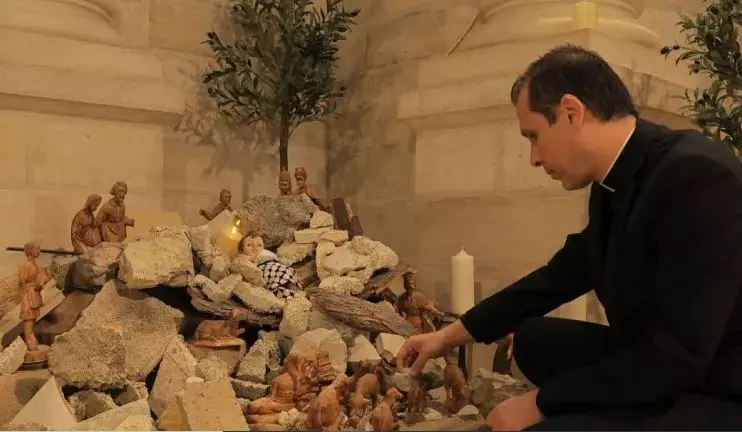
If Christ were born today, it would be amidst Israeli shelling
text_fieldsThe churches of Palestine have made a sombre decision to cancel Christmas celebrations in solidarity with Gaza. The move, aimed at expressing unity and rejecting the ongoing aggression against Palestinians, signifies a poignant stance against the backdrop of relentless Israeli bombardment.
In Bethlehem, the heart of religious significance, the Lutheran Church has taken a symbolic step to portray the harsh reality of children living in present-day Palestine. The traditional nativity scene, typically a depiction of tranquillity and hope, now features Baby Jesus nestled in a manger of rubble and destruction.
Reverend Munther Isaac, speaking on behalf of the church to Al Jazeera, emphasized that if Christ were born today, it would be amidst the chaos and Israeli shelling in occupied territories.
The decision to alter the nativity scene serves as a powerful message to the world during the holiday season. Reverend Isaac and other church leaders believe it reflects the true meaning of Christmas—the birth of Christ as a messenger of justice, peace, and dignity for humanity.
The assertion that Christ was born in an occupied land resonates with the current state of Palestine, echoing the struggles faced by its people.
The gesture is not only symbolic but an expression of shared pain and helplessness in the face of the ongoing crisis, particularly in Gaza. The city of Bethlehem, traditionally a beacon of joy during Christmas, now stands as a sombre reminder of the broader struggle for justice and the legitimacy of Palestinian existence.
The nativity scene's portrayal has deeply moved many upon seeing Baby Jesus amidst the rubble.
Reverend Isaac recently delivered a letter from Bethlehem's churches to the US administration, urging President Biden, the US Congress, and church leaders to apply Christ's message of rejecting injustice and calling for an end to the genocidal war in Gaza.
The letter emphasizes the collective responsibility to raise voices against the war, reminding the West of the existence of Palestinian Christians and the impact of the conflict on all Palestinians.
The struggle for change, however, faces challenges, as some in the West justify Israel's assault on Gaza as self-defence. Reverend Isaac expressed his sadness at such justifications, highlighting the toll on innocent lives, children, and vital infrastructure like churches and hospitals.
Despite the sadness and pain, there is a persistent sense of hope among the people of Bethlehem. Anton Nassar, the principal of Dar Al-Kalima Lutheran School, acknowledges the city's current state but emphasizes the belief in hope.
He sees the nativity scene as a representation not just of the harsh reality but also as a symbol of a new light emerging amidst the pain—a hope for a just peace in the region.
In the midst of their struggles, the people of Bethlehem aspire to live in peace and work towards the realization of an independent state with its capital in Jerusalem. Christmas, they say, is not just a celebration but a heartfelt plea for a brighter future in the Holy Land.






















